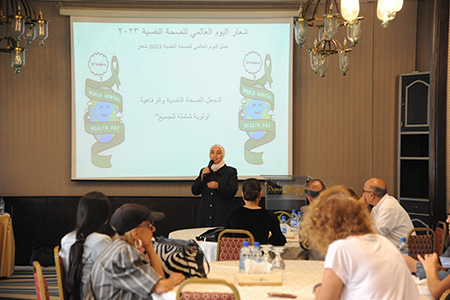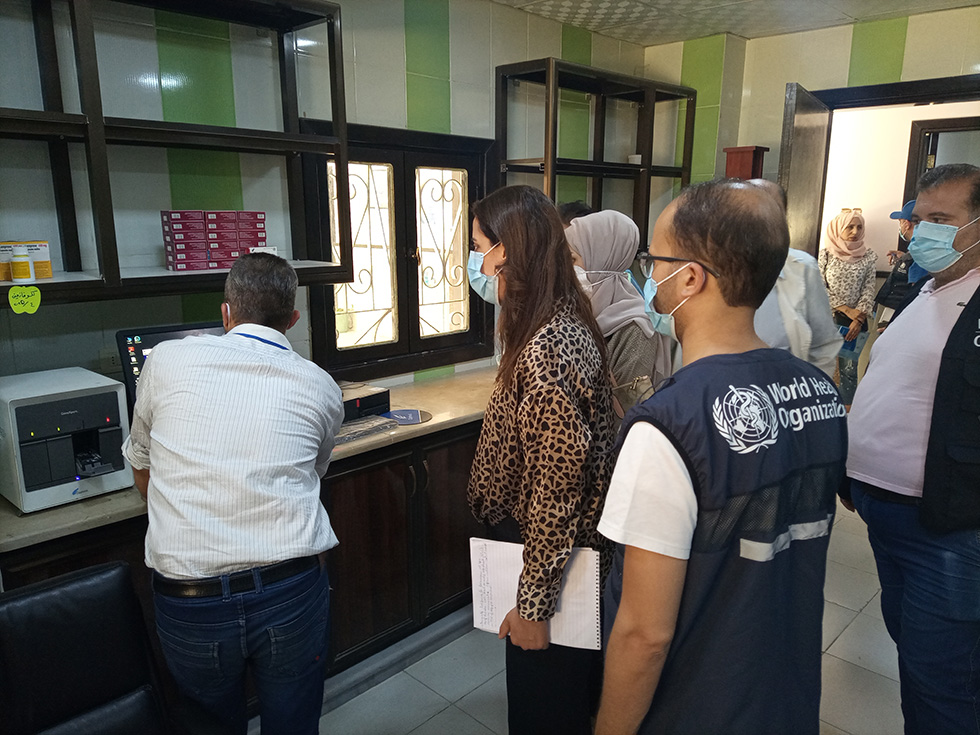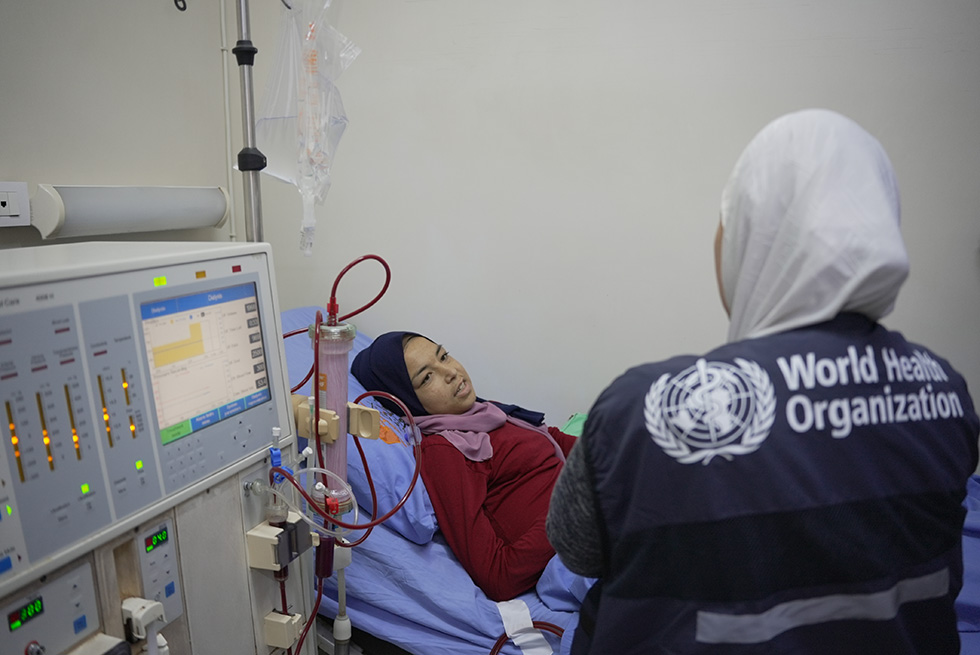WHO and Ministry of Health illuminate the path to a more resilient Syria on World Mental Health Day
 10 October 2023, Damascus, Syria – To mark World Mental Health Day, WHO and the Syrian Ministry of Health launched a 2-day workshop for media professionals to emphasize this year’s theme, “Mental health is a universal human right.” The activity aims to improve knowledge, raise awareness and drive actions that promote and protect everyone’s mental health.
10 October 2023, Damascus, Syria – To mark World Mental Health Day, WHO and the Syrian Ministry of Health launched a 2-day workshop for media professionals to emphasize this year’s theme, “Mental health is a universal human right.” The activity aims to improve knowledge, raise awareness and drive actions that promote and protect everyone’s mental health.
“It’s essential to underscore that mental health is not a luxury; it is a basic human right,” said Dr Iman Shankiti, Acting WHO Representative in Syria. “Regardless of who we are or where we come from, everyone deserves the highest attainable standard of mental health. This not only entails prevention, but also includes access to quality mental health care.”
Many years of crisis have affected the health and mental well-being of people in Syria. The negative impacts have been further exacerbated by the COVID-19 pandemic, disease outbreaks, the recent earthquake and the country’s ongoing economic challenges.
WHO has responded with mental health initiatives that have reached more than 922 000 individuals in 2023 alone. Over 197 000 people in earthquake-affected areas have benefited from integrated and specialized consultations at primary health care centres, and mental health and psychosocial support (MHPSS) services have been provided to more than 161 000 individuals. Moreover, WHO has invested in training over 3000 health and community workers to ensure the sustainability of these essential services.
To promote a multisectoral approach to services, WHO has also supported the Ministry of Health in developing and rolling out the national mental health and psychosocial support (MHPSS) strategy. This strategy, which involves numerous partners and stakeholders, clarifies the vision, goals and actions that will guide the phased enhancement of MHPSS services from 2023 to 2027, in line with regional and global frameworks.
To pave the way for a healthier, more resilient future, WHO emphasizes the critical importance of healing the minds and spirits of everyone in Syria who has been deeply affected by years of turmoil. WHO remains ready to lend its expertise and resources to support this effort.
Strengthening TB services along cascade of care in Syria

4 October 2023, Damascus, Syria - The World Health Organization (WHO) recently conducted a regional Green Light Committee (rGLC) mission to Syria, focusing on strengthening Syria's National Tuberculosis Programme (NTP). The mission involved updating the national multi-drug-resistant guidelines and conducting training sessions on new WHO-recommended treatments for both drug-susceptible Tuberculosis (DS-TB) and drug-resistant Tuberculosis (DR-TB).
The Syrian conflict has heavily disrupted the health system, leaving thousands of people unable to access TB prevention, diagnosis, and treatment services. Moreover, millions of internally displaced people (IDPs) live in poor conditions, overcrowded and in unsanitary camps and settlements creating conditions that increase the risk of transmission and exacerbate the disease. WHO is collaborating with the Syrian Ministry of Health (MoH) and other partners to strengthen the NTP and work towards eliminating the disease in the country. The introduction of new diagnostics and treatments, particularly at the subnational level, is a key part of these efforts.
Dr. Iman Shankiti, WHO Representative a.i. in Syria, stressed the need for a comprehensive approach: "Addressing tuberculosis in Syria requires not just advanced diagnostics and treatments, but a shared commitment to improving health services accessibility across all areas of the country – particularly for those most vulnerable and in need."
Both the MOH and WHO, together with other health partners, are committed to implementing the guidelines and recommendations developed during the rGLC mission. The introduction of new diagnostics and treatments, such as all-oral shorter regimens, is expected to improve patient adherence and health outcomes.
Dr. Kenza Bennani, Medical Officer of the WHO Regional TB Program, affirmed, "The novel diagnostics and treatments provide an opportunity to enhance outcomes for TB and drug resistant TB patients in Syria. Ensuring comprehensive access to the novel advanced tools and treatments with sustainable resources and support will lead to further progress in coverage of services for TB along the full-service cascade, including prevention, diagnosis and treatment."
EU Donations Bring Renewed Hope to People in Syria

Amid the many hardships endured by Syrians, stories of hope, strength and courage emerge. Aya, a 20-year-old from rural Homs Governorate, was diagnosed with kidney disease at the age of 17. Since then, she has had to undergo life-saving dialysis three times a week.
"Learning that I would need dialysis was shocking news. I’ve had to accept that the dialysis machine is now my lifeline," said Aya. "Although my medical condition is part of my life, it's not the whole story. My dreams remain intact, and I am determined to do something meaningful with my life.”
Aya lost her older brother to kidney failure three years ago. Her father does not have a steady job, and her mother is battling cancer. Like most Syrians, the family struggles to make ends meet and cannot afford the cost of health care.
"I am so grateful to the Afia Fund Association (AFA) for subsidizing my dialysis treatment and medicines,” said Aya. “The centre is my second home, and the staff are like family to me."
Aya is one of many patients with kidney disease who are receiving free medical treatment at the WHO-supported AFA Medical Centre. WHO’s support has been made possible thanks to generous funding from the European Commission Directorate-General for Humanitarian Aid and Civil Protection (ECHO). The funds provided by ECHO have allowed WHO to support seven NGOs and one private hospital in the governorates of Aleppo, Al-Hasakeh, Homs and Rural Damascus to provide life-saving, essential health services to those in need.
Dr Iman Shankiti, WHO Representative a.i. in Syria, said that ECHO’s steady funding had been invaluable in helping WHO deliver on its commitments. “ECHO has been a long-standing supporter of our work in Syria. Its continued, substantial contributions have helped us ensure that some of the most vulnerable people in the country can continue to access critical health care.”
With the latest contribution from ECHO, WHO supported more than 293 700 primary health care consultations and 25 000 mental health and psychosocial support consultations and has covered the costs of 6924 haemodialysis sessions for 182 patients. WHO is grateful for ECHO’s continued support to the people of Syria – these efforts have made a difference in the lives of hundreds of thousands of patients and their families.
Ministry of Health and WHO conclude MHPSS strategy workshop in Syria
19 September 2023, Damascus, Syria – Last week, the Ministry of Health and WHO concluded a two-day workshop on the draft national mental health and psychosocial support (MHPSS) strategy for Syria. The workshop discussed the vision, goals and actions of the MHPSS strategy under development, which will guide the phased scale-up of MHPSS services across sectors from 2023 to 2027.
Dr Iman Shankiti, Acting WHO Representative in Syria, remarked, “This workshop is a milestone in prioritizing mental health in Syria’s recovery. It reflects our joint commitment with the Ministry of Health, other ministries and partners to create a comprehensive MHPSS strategy. The focus is on both service delivery and community empowerment across sectors. Together, we are paving the way for a more resilient Syria.”
Participants agreed on the need for a comprehensive and effective MHPSS strategy for Syria. They also agreed on the importance of working together to ensure that the strategy is implemented effectively. The workshop explored the main elements of the MHPSS strategy in development.
The draft MHPSS strategy calls for:
integration of MHPSS considerations across all national agencies’ preparedness, response and recovery policies, plans and frameworks;
advocacy for the provision of adequate and sustainable financing for MHPSS;
strengthening of the capacity of the health and social care systems to deliver MHPSS to people in need across the continuum of care;
participation of communities and people with lived experiences in all aspects of MHPSS planning, implementation and monitoring and evaluation across the emergency cycle; and
advocacy to strengthen action on mental health promotion and prevention of mental, neurological, and substance use disorders.


